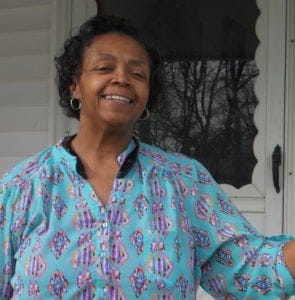
Josie Glover thought, “Never in my wildest dreams” she could someday own her own home. She saved and saved, then took a series of classes through Lorain Metropolitan Housing Authority to guide her through the process.
When she found the perfect home, she signed up for automatic withdrawal so her payment would never be late. Her loan was sold to another lender, but somehow, the direct withdrawal information was not. Suddenly, she was behind in her payments.
She had the money in her account and wrote a letter to the bank, but they wouldn’t accept payments
they considered “late.” The bank also refused to consider the incomes of the other members of the household, her son, who gets SSI, and daughter who works as a phlebotomist.
She applied for a loan modification in 2013, but was turned down for the same reason. She was facing foreclosure and turned to Legal Aid for help.
Ms. Glover’s mortgage loan was insured by the Federal Housing Administration (FHA). Her Legal Aid attorney, Phil Althouse, knew that federal regulations related to FHA loans required Ms.Glover’s lender consider the other household
income. He also identified other violations of Ms. Glover’s legal rights by the lender and promptly filed motions that prevented a foreclosure judgment from being finalized. Mr. Althouse knew that there was more to be done for Ms.
Glover and advised her to file a charge of discrimination against the mortgage lender with the Ohio Civil Rights Commission. Ms. Glover’s mortgage lender signed a settlement agreement with Ms. Glover and the Commission. As part of the settlement Ms. Glover obtained a loan modification. The settlement also resulted in the monitoring of FHA lenders services in Ohio.
But the lender failed to adhere to the terms of the agreement so Mr. Althouse requested that the case be re-opened by the Commission. The Commission referred the matter to the Ohio Attorney General’s office for further action which helped resolve all issues to Ms. Glover’s satisfaction.
“Ms. Glover had the benefit of legal counsel. Other borrowers may not be as fortunate,” states attorney Althouse. As a result of the Ms. Glover’s case, the Civil Rights Section of the Ohio Attorney General’s office now closely collaborates with legal aid programs around the state to better protect the civil rights of low-income clients.
Ms. Glover was able to secure a fair loan modification agreement and hold the mortgage servicer accountable for acting in bad faith. More importantly, the support of Legal Aid allowed Ms. Glover to keep her home. “It was scary and frustrating,” recalls Ms. Glover. “I didn’t know who to turn to, but Mr. Althouse was great. He put his all into helping me.” She is looking forward to celebrating the holidays in her home.
Click here to view the full Poetic Justice Issue where this story appeared.